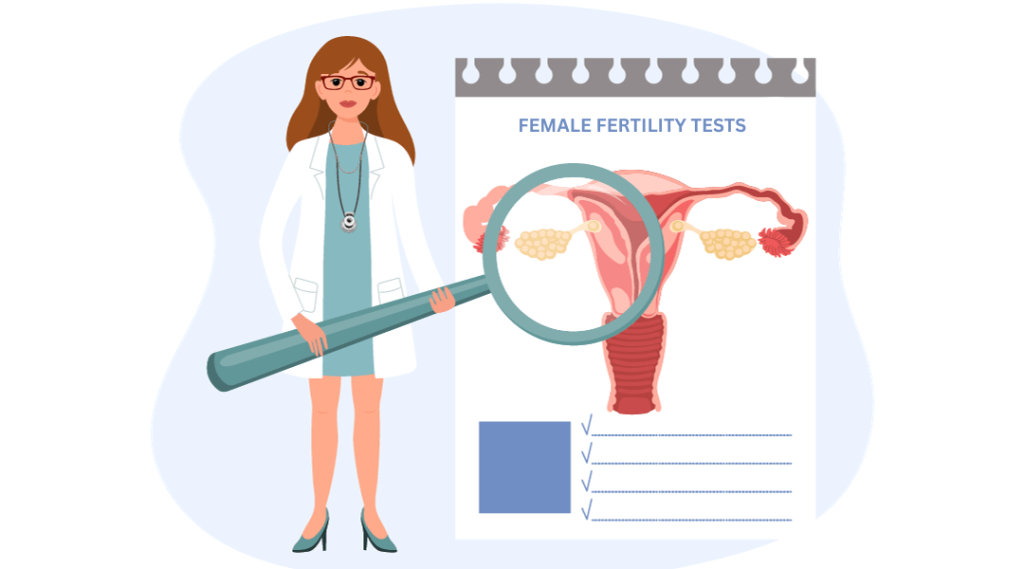Let’s delve into a topic of paramount importance, yet approach it with simplicity and clarity – fertility tests for everyone, encompassing both men and women. These tests aim to uncover the reasons a couple might face challenges while trying to conceive.
To begin with, what exactly is fertility? At its core, fertility signifies the ability to conceive a child. Several individuals encounter difficulties in this area, and that’s perfectly alright. In these situations, doctors play a crucial role, utilizing various tests to pinpoint the underlying issues.

Male Fertility
Men, too, can face challenges that hinder their contribution to the conception process. Gents, it’s not always a straight road when it comes to playing your part in the baby-making dance. Let’s get into the nitty-gritty of the common roadblocks and their solutions:
- Varicocele: Think of it as a sort of traffic jam in the veins of the scrotum. It can cause a drop in sperm quality and quantity.
- Infections: Certain infections can interfere with sperm production or sperm health or can cause scarring that blocks the passage of sperm.
- Ejaculation Issues: From retrograde ejaculation to other ejaculation problems, these can prevent sperm from reaching the lady’s egg.
- Hormonal Imbalances: Just like the ladies, gents too can have hormonal hiccups which can impede sperm production.
- Environmental Toxins: Overexposure to certain environmental elements such as radiation can affect sperm production.
- Lifestyle Choices: Smoking, alcohol, certain medications, and even obesity can play a spoilsport in sperm production.
To gain insights into these issues, doctors can conduct a semen analysis. Think of this as a comprehensive health check-up for sperm, ensuring they are robust and agile.

Female Fertility
Women might face their own set of challenges when it comes to conception, such as:
- Ovulatory Disorders: Issues like Polycystic Ovary Syndrome (PCOS) can mess with the regular release of eggs.
- Fallopian Tube Damage: This can prevent the sperm from getting to the egg or block the passage of the fertilised egg into the uterus.
- Endometriosis: When tissue similar to the lining inside the uterus grows outside the uterus, it can impact fertility.
- Uterine or Cervical Abnormalities: Polyps, tumours, or even the shape of the uterus can hamper the chances of a baby.
- Pelvic Adhesions: Bands of scar tissue that bind organs can be caused by infections, surgeries or endometriosis.
- Early Menopause: Some women experience menopause before the age of 40. Though the cause is often unknown, certain conditions like immune system diseases can play a role.
- Cancer Treatments: Certain cancer therapies can result in female infertility.
To diagnose these issues, doctors employ a range of tests, from urine assessments to progesterone evaluations. These tests delve deep into the female reproductive system, ensuring everything functions optimally for conception.

Embracing the Journey: Support and Positivity
Facing fertility challenges can be emotionally taxing, but it’s vital to remember that help is at hand. Doctors who specialize in fertility treatments and offer a beacon of hope to many. With the right guidance, countless individuals and couples overcome these challenges, paving the way to parenthood.
Always remember, you’re not embarking on this journey in isolation. Let’s continue to enlighten ourselves, extend mutual support, and maintain optimism as we navigate the intricate realm of fertility and its myriad facets.
References:
- https://americanpregnancy.org/getting-pregnant/understanding-fertility/
- https://www.mayoclinic.org/diseases-conditions/male-infertility/symptoms-causes/syc-20374773
- https://www.who.int/reproductivehealth/topics/infertility/semen_analysis/en/
- https://www.mayoclinic.org/diseases-conditions/female-infertility/symptoms-causes/syc-20354308
- https://www.acog.org/womens-health/faqs/evaluating-infertility
- https://www.health.harvard.edu/a_to_z/infertility-a-to-z
Leave a Reply